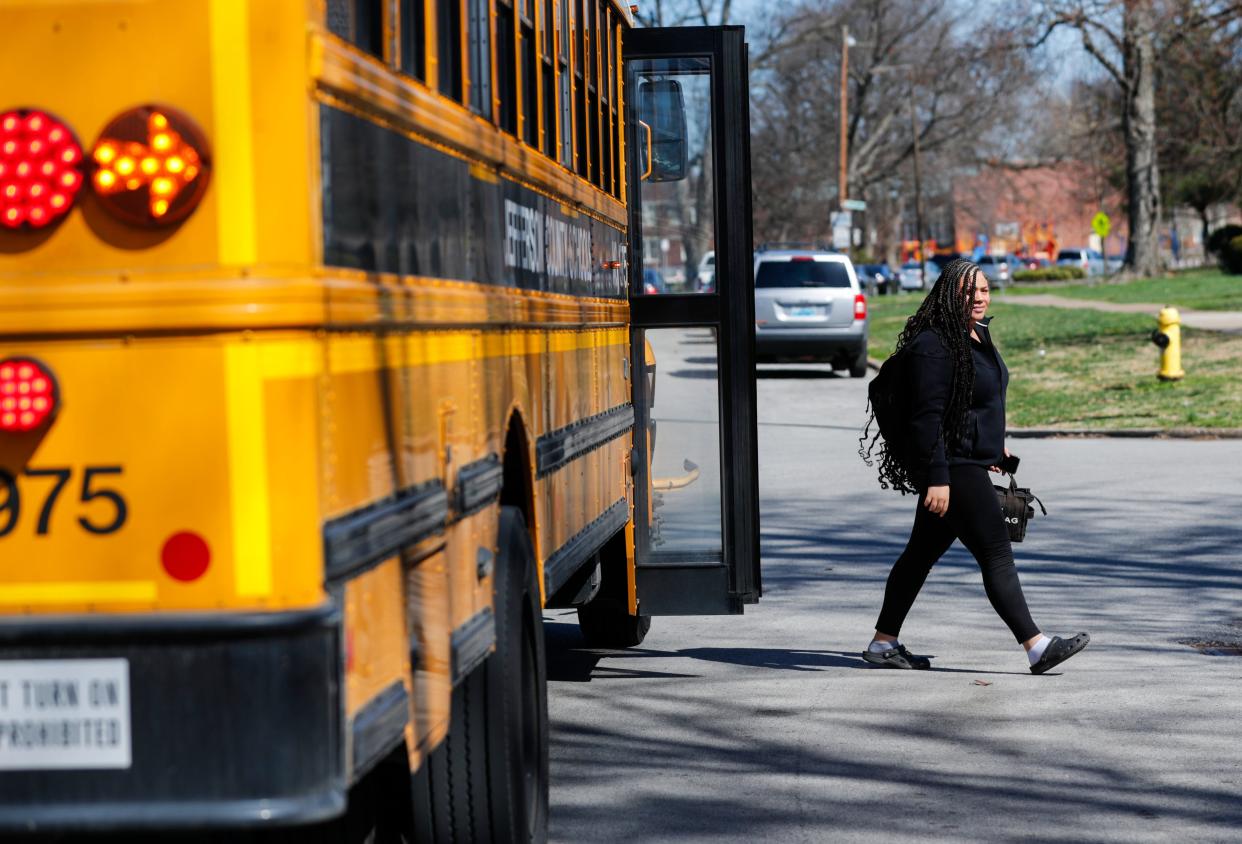‘Central as we know it will be gone’: JCPS magnet schools fear future without busing

A previous version of this story gave the wrong native country for Central High School student Louisa Sarpee. She is from Liberia.
Sophomore Ava Williams chose to attend Central High solely because of its teaching and learning magnet program, but in her two years at the school she's gained far more than she ever expected.
She's gotten hands-on experience tutoring elementary school students. She's decided to attend a historically Black college after experiencing an educational setting where the teachers and students look like her. She also has overcome struggles with social anxiety after working weekly with the school's mental health practitioner.
But Williams is concerned that she won't get to attend Central if Jefferson County Public Schools eliminates busing for magnet students.
"It really upsets me and makes me nervous," she said.
Williams lives about 7 miles away in the Iroquois neighborhood, and her parents' work schedules don't allow them to take her to and from school every day. No bus means she will have to attend a different school, she said.
The district's recently implemented student assignment plan was meant to, in part, increase access to all magnets for poor and minority students, but ending magnet transportation could further exacerbate the longstanding issue, even at a school that's historically served this group.
"Without free and accessible transportation, magnet schools may be realistic only for families with the resources and flexibility to provide their children with transportation," according to a report by the Learning Policy Institute.
Despite this, district leaders say ending transportation for about 16,000 magnet school bus riders is the only way they can ensure all bused students get to and from school on time next year. JCPS board members are set to make a decision next week about the future of busing for magnet students.
They say fixing the problem is imperative due to the ongoing bus driver shortage. Under the current system, Black and impoverished students are missing a disproportionate amount of instructional time compared to their affluent and white counterparts because of buses arriving late to school.

'Central as we know it will be gone'
Central High, Louisville's first public school that Black children could attend, is particularly concerned about losing bus transportation for its six magnet programs.
About 93% of its students rode the bus last year. Central High Assistant Principal Ryan Bringhurst sent a transportation survey to families, and out of 200 parents who responded, 57% said they would have to switch their child's school if busing ends.
"Central as we know it will be gone," Bringhurst wrote in a social media post about the survey results. "Losing 100 students, that’s probably 4-5 teachers and other staff. But 200? 400? If 50% of our students left for their home schools that means we will lose 50% of our staff, 50% of the band, 50% of (Black Student Union), 50% of our track athletes ..."
The move will diminish the offerings Central can give students still able to stay at the school, he continued.
"Losing students and teachers also means our magnets get consolidated and/or eliminated," he wrote. "Which ones? We don’t know."
Like Williams, freshman Louisa Sarpee attends Central but will likely have to change schools if busing isn't provided.
A Liberian native, Sarpee immigrated to the United States in 2013 and has since decided she wants to practice international law to "focus on helping families like mine." Acceptance into Central's law magnet is preparing her for those aspirations, and her resides school — Pleasure Ridge Park — doesn't offer that pathway.
Taking away her bus, Sarpee said, would have "a big impact for kids like me who applied when they were promised a ride to and from school. ... When you promise something to students, then you have to follow through with it."
Chris Brown, a teacher at Central in his 16th year, said many of the kids in the school's robotics program would also have to switch schools.

With far fewer students, the donations and equipment that the program has received — including a NASA grant — would be underutilized.
"Those investments would just sit," Brown said.
Because Central is located past Louisville's infamous 'Ninth Street divide,' Brown noted that it is harder to reach for many families and is in an area some don't otherwise visit.
Some have suggested that students use the city's public transportation system, TARC, to get to school, but that system is already strained and underfunded, according to Carrie Butler, the former executive director.
Brown also questioned how the resides high schools will deal with stark increases in their enrollment resulting from students who can no longer attend magnets.
"The unintended consequences – I’m not sure if they’ve necessarily thought out all of those," he said.
Contact Krista Johnson at [email protected].
This article originally appeared on Louisville Courier Journal: Central High and JCPS magnet schools fear future without busing
